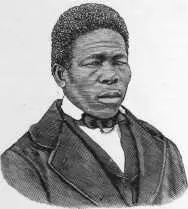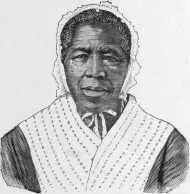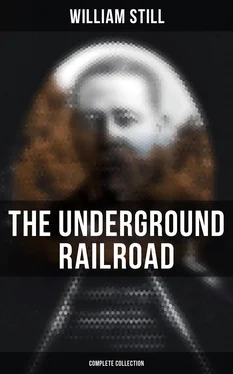As regards the price fixed upon by you for the family, I must say I do not think it possible to raise half that amount, though Peter authorized me to say he would give you twenty-five hundred for them. Probably he is not as well aware as I am, how difficult it is to raise so large a sum of money from the public. The applications for such objects are so frequent among us in the North, and have always been so liberally met, that it is no wonder if many get tired of being called upon. To be sure some of us brothers own some property, but no great amount; certainly not enough to enable us to bear so great a burden. Mother owns a small farm in New Jersey, on which she has lived for nearly forty years, from which she derives her support in her old age. This small farm contains between forty and fifty acres, and is the fruit of my father's toil. Two of my brothers own small places also, but they have young families, and consequently consume nearly as much as they make, with the exception of adding some improvements to their places.
For my own part, I am employed as a clerk for a living, but my salary is quite too limited to enable me to contribute any great amount towards so large a sum as is demanded. Thus you see how we are situated financially. We have plenty of friends, but little money. Now, sir, allow me to make an appeal to your humanity, although we are aware of your power to hold as property those poor slaves, mother, daughter and two sons, — that in no part of the United States could they escape and be secure from your claim — nevertheless, would your understanding, your heart, or your conscience reprove you, should you restore to them, without price, that dear freedom, which is theirs by right of nature, or would you not feel a satisfaction in so doing which all the wealth of the world could not equal? At all events, could you not so reduce the price as to place it in the power of Peter's relatives and friends to raise the means for their purchase? At first, I doubt not, but that you will think my appeal very unreasonable; but, sir, serious reflection will decide, whether the money demanded by you, after all, will be of as great a benefit to you, as the satisfaction you would find in bestowing so great a favor upon those whose entire happiness in this life depends mainly upon your decision in the matter. If the entire family cannot be purchased or freed, what can Vina and her daughter be purchased for? Hoping, sir, to hear from you, at your earliest convenience, I subscribe myself,
Your obedient servant, WM. STILL.
To B. McKiernon, Esq.
No reply to this letter was ever received from McKiernon. The cause of his reticence can be as well conjectured by the reader as the writer.
Time will not admit of further details kindred to this narrative. The life, struggles, and success of Peter and his family were ably brought before the public in the "Kidnapped and the Ransomed," being the personal recollections of Peter Still and his wife "Vina," after forty years of slavery, by Mrs. Kate E.R. Pickard; with an introduction by Rev. Samuel J. May, and an appendix by William H. Furness, D.D., in 1856. But, of course it was not prudent or safe, in the days of Slavery, to publish such facts as are now brought to light; all such had to be kept concealed in the breasts of the fugitives and their friends.

PETER STILL
THE KIDNAPPED AND RANSOMED.

CHARITY STILL
TWICE ESCAPED FROM SLAVERY.
The following brief sketch, touching the separation of Peter and his mother, will fitly illustrate this point, and at the same time explain certain mysteries which have been hitherto kept hidden —
Table of Contents
With regard to Peter's separation from his mother, when a little boy, in few words, the facts were these: His parents, Levin and Sidney, were both slaves on the Eastern Shore of Maryland. "I will die before I submit to the yoke," was the declaration of his father to his young master before either was twenty-one years of age. Consequently he was allowed to buy himself at a very low figure, and he paid the required sum and obtained his "free papers" when quite a young man — the young wife and mother remaining in slavery under Saunders Griffin, as also her children, the latter having increased to the number of four, two little boys and two little girls. But to escape from chains, stripes, and bondage, she took her four little children and fled to a place near Greenwich, New Jersey. Not a great while, however, did she remain there in a state of freedom before the slave-hunters pursued her, and one night they pounced upon the whole family, and, without judge or jury, hurried them all back to slavery. Whether this was kidnapping or not is for the reader to decide for himself.
Safe back in the hands of her owner, to prevent her from escaping a second time, every night for about three months she was cautiously "kept locked up in the garret," until, as they supposed, she was fully "cured of the desire to do so again." But she was incurable. She had been a witness to the fact that her own father's brains had been blown out by the discharge of a heavily loaded gun, deliberately aimed at his head by his drunken master. She only needed half a chance to make still greater struggles than ever for freedom.
She had great faith in God, and found much solace in singing some of the good old Methodist tunes, by day and night. Her owner, observing this apparently tranquil state of mind, indicating that she "seemed better contented than ever," concluded that it was safe to let the garret door remain unlocked at night. Not many weeks were allowed to pass before she resolved to again make a bold strike for freedom. This time she had to leave the two little boys, Levin and Peter, behind.
On the night she started she went to the bed where they were sleeping, kissed them, and, consigning them into the hands of God, bade her mother good-bye, and with her two little girls wended her way again to Burlington County, New Jersey, but to a different neighborhood from that where she had been seized. She changed her name to Charity, and succeeded in again joining her husband, but, alas, with the heart-breaking thought that she had been compelled to leave her two little boys in slavery and one of the little girls on the road for the father to go back after. Thus she began life in freedom anew.
Levin and Peter, eight and six years of age respectively, were now left at the mercy of the enraged owner, and were soon hurried off to a Southern market and sold, while their mother, for whom they were daily weeping, was they knew not where. They were too young to know that they were slaves, or to understand the nature of the afflicting separation. Sixteen years before Peter's return, his older brother (Levin) died a slave in the State of Alabama, and was buried by his surviving brother, Peter.
No idea other than that they had been "kidnapped" from their mother ever entered their minds; nor had they any knowledge of the State from whence they supposed they had been taken, the last names of their mother and father, or where they were born. On the other hand, the mother was aware that the safety of herself and her rescued children depended on keeping the whole transaction a strict family secret. During the forty years of separation, except two or three Quaker friends, including the devoted friend of the slave, Benjamin Lundy, it is doubtful whether any other individuals were let into the secret of her slave life. And when the account given of Peter's return, etc., was published in 1850, it led some of the family to apprehend serious danger from the partial revelation of the early condition of the mother, especially as it was about the time that the Fugitive Slave law was passed.
Читать дальше














